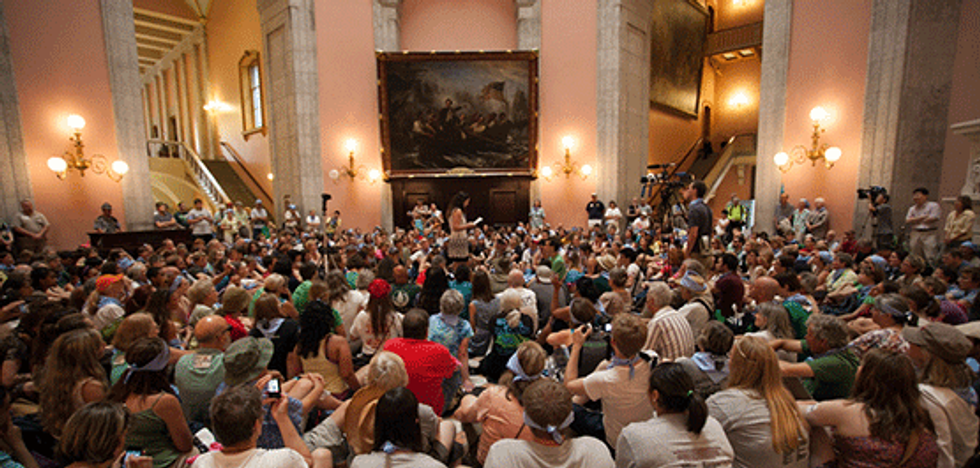Last week nearly 1,000 people took over the Ohio Statehouse. Joined by others from neighboring states, they came together to protest the destructive gas drilling method called hydraulic fracturing, or "fracking." After rallying and marching to the Capitol building, hundreds poured in--without a permit--to hold a "People's Assembly" to decide how they, the people, could end the practice in their state.
Jamie Frederick was one of them. She had been told by doctors that it was safe to drink her well water, despite the gas wells surrounding her home. When she got sick, she was told to drink more water. She later discovered it was contaminated with chemicals used in the fracking process. As a result, she has lost her gall bladder and can't risk having children because of fatal health risks and potential birth defects.
"If there had been solar panels and wind turbines surrounding my home instead of gas wells, I never would have gotten sick, and I would be called 'Mom'," she told the crowd. These days, she said, her mouth bleeds and it's difficult to talk: "I am losing my voice more all the time. But I seem to have found it today."
As the Assembly convened, the rotunda, filled to capacity, thundered with stomping, clapping, and chanting that was hushed when families shared experiences of being devastated by the side effects of fracking, as Frederick was. Some had been invited to testify at the Statehouse in the past, only to find empty rooms and legislators who, they felt, did not respect their concerns.
These stories had been shared throughout the lead-up to the action, with three full days committed to workshops, trainings, and cross-movement strategy sessions. Teri Blanton, of Appalachia, connected fracking to another highly destructive extraction process she has been fighting in her own community: mountaintop removal coal mining. "They're trying to do to you what they've done to us," she said. "'Regulation' just gives them permission to do it. If you think regulation works, take a look at the West Virginia strip mining."
The Ohio People's Assembly ended with the passage of a "people's legislation" to ban fracking. Though no actual law backs this resolution, it signifies a commitment by many in the state to organize to stop the practice of fracking.
This July will see thousands more mobilize in Washington, D.C. for the Don't Stop the Frack Attack rally. Grassroots communities across New York State are already hatching plans to take action against Governor Andrew Cuomo's attempt to turn the Southern Tier of New York into a fracking sacrifice zone. This creative, nonviolent action bubbling across the United States reflects a growing united movement to halt extreme energy development that comes at the expense of both people and the planet.



